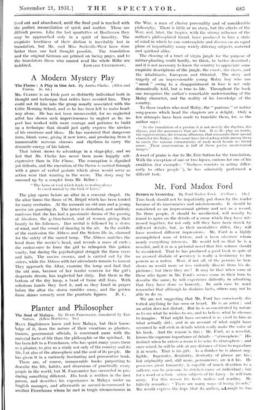A Modern Mystery Play
The Flame : A Play in One Act. By Austin Clarke. (Allen and
Unwin. 3s. lid.)
Mn. CLARKE is an Irish poet so distinctly individual both in thought and technique that critics have avoided him. They could not lit him into the group usually associated with the Celtic Morning School, and so he has been left to make head- way alone. He has not been unsuccessful, for no neglected artist has shown such imperviousness to neglect as he, no
poet has worked with more courage and patience to build up a technique that should just aptly express the niceties of his emotions and ideas. Ile has mastered that dangerous form, blank verse, giving it new force, and producing front it inntunerable nervous stresses and rhythms to carry the dramatic energy of his talent.
That talent shows to advantage in a stage-play, and we feel that Mr. Clarke has never been more happily self- expressive than in The Flame. The conception is dignified yet delicate, and the execution of the theme is carried through with a grace of verbal gesture which alone would serve as action were that wanting in the scene. The story may be summed up by a couplet from Mr. Belloc : " The Love of God which leads to realms above - Js cheek-mated by the God of Love."
The play opens before an altar in a convent chapel. On the altar burns the flame of St. Brigid which has been tended for many centuries. At the moment an old nun and a young novice arc guarding it. The latter is disturbed, and suddenly confesses that she has had a passionate dream of the passing of Absalom, the golden-haired, and of women giving their beauty to his followers. Iler recital is followed by a storm of wind, and the sound of dancing in the air. In the middle of the confession the Abbess and the Sisters file in, alarmed for the safety of the sacred lamp. The Abbess snatches the hood from the novice's head, and reveals a mass of curls ; she endeavours to force the girl to relinquish this golden vanity, but during the psychological struggle the flame veers and fails. The novice swoons, and is carried out by the sisters, while the Abbess with her attendants remain lo lament They approach the Altar, examine the lamp and had that the old nun, because of her tender concern for the girls desperate dream, has neglected her duty. But there in the bottom of the dry lamp, a bead of flame still lives. With solicitous hands they feed it, and as they kneel in prayer before the altar the storm rumbles away, and the golden
flame shines serenely over the prostrate figures. R. C.
































































 Previous page
Previous page